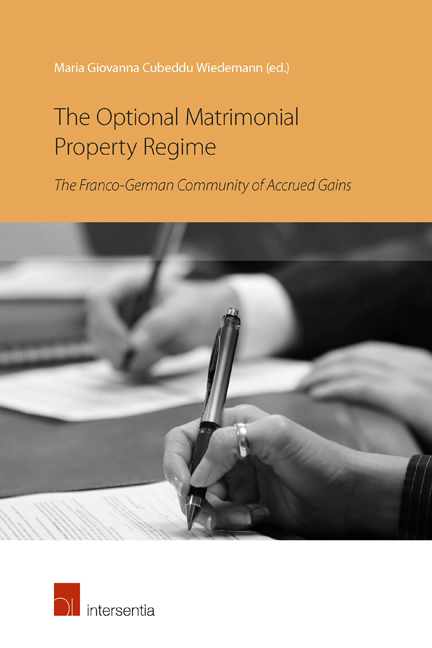Preface
Published online by Cambridge University Press: 28 November 2017
Summary
European family law can be a fascinating topic. The family law of each Member State is different, and it is a challenge in Europe to try to use the law to achieve practical solutions to the problems encountered by national and transnational couples. The solutions proposed should also be regarded as providing guidance and helping to resolve future issues.
The genesis of this book lies in a project regarding property relations between spouses, which was presented for the first time at the Tagung der Wissenschaft-lichen Vereinigungfür das Familienrecht in Potsdam, Germany.
The Franco-German Agreement on the establishment of an optional matrimonial property regime, which became law in both countries in 2013, is the first attempt at unifying substantive matrimonial property law in Europe. The innovations included in the Agreement maybe useful for the adoption of the same instrument in different states.
This study promotes the spread of the Franco-German regime on a European and international level. The Agreement's added advantage is to offer a joint instrument that does not require the parties to give up their domestic laws. The contents and specifics of the joint optional property regime can be better understood by comparison with domestic regulations in France and Germany. The importance of this is showcased through a comparison of German, Swiss, Italian and Dutch matrimonial property regimes.
Due to the increasing mobility of persons within the European Union it is considered desirable that other Member States accede to the Agreement. To promote this, the book provides a short commentary on the law, accurate and timely translations of the normative text, the memoranda and explanatory reports, as well as the German implementing legislation, in English, Italian and Spanish.
The book is, in a broad sense, also intended to assist lawyers in helping spouses to enter into matrimonial agreements. It will also be of considerable interest to policy-makers and economists concerned with family law. European family law can also be an enjoyable and rewarding topic to study and I hope this book will be useful, not only in revision and in question-answering techniques, but also in providing students with enthusiasm for the subject.
Information
- Type
- Chapter
- Information
- The Optional Matrimonial Property RegimeThe Franco-German Community of Accrued Gains, pp. v - viPublisher: IntersentiaPrint publication year: 2014
